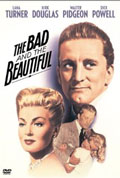
Directed by
Vincente Minnelli
118 minutes
Rated PG
Reviewed by
Bernard Hemingway

The Bad And The Beautiful
Vincent Minnelli's behind-the-scenes exposé of Tinsel Town’s morally-compromised universe won a raft of Oscars including Best Script (by Charles Schnee), Best Black and White Cinematography for Robert Surtees and Best Art Direction, Set Decoration and Costume Design but not a Best Film, Best Direction, or Best Actress/Actor award.
"Tribute to a Bad Man" the title of the Ladies Home Journal article on which Schnee’s screenplay was based is more appropriate to the film’s point of view which is embodied by Walter Pidgeon’s studio boss as he attempts to broker a deal with a trio of characters; starlet Lana Turner, Dick Powell as a Pulitzer Prize-winning screenwriter and Barry Sullivan as an A-list film director. Using the ready-made flashback technique he tries to persuade them that what they considered to be cold betrayal by Shields in the early years of their careers was, in hindsight, their making. There is, needless to say, no surprise about the final outcome of Pidgeon's entreaties, a result captured in an excruciatingly sappy and physically impossible final scene.
Whilst the tripartite structure of the screenplay should have been an effective way to bring the material home, it gradually becomes less tenable and more stereotypical, turning into a log-jam with that aforementioned resolving final scene. Sullivan’s story is an economical and credible illustration of Shield’s perfidy but Turner’s resistance hangs on a rather coyly-handled and completely unmotivated character turn-around. As for Powell, who spends the entire film with his pipe dangling out his mouth as a bona fide of his paternalistic rationality and intellectual and moral superiority has resort to the most basic expression of male powerlessness - the sucker-punch - and this for an act whose consequence is grossly out of proportion to the relative mundanity of the preceding stories (with Grahame’s annoying Southern belle seemingly intended to mollify the extremity of her sacrifice to the plot).
For his scenery-chewing performance as the egomaniacal producer, Douglas was nominated for a Best Actor Oscar but somewhat ironically, lost to the ever-wooden Gary Cooper for High Noon.Lana Turner delivers one of her best performances, her confrontation with Douglas being an outstanding serving of screen melodrama. Gloria Grahame won the Best Supporting Oscar for some seven minutes of screen-time.
FYI: For a more elegant and credible treatment of similarly-themed material see Joseph L Mankiewicz's All About Eve (1950).
Want something different?





